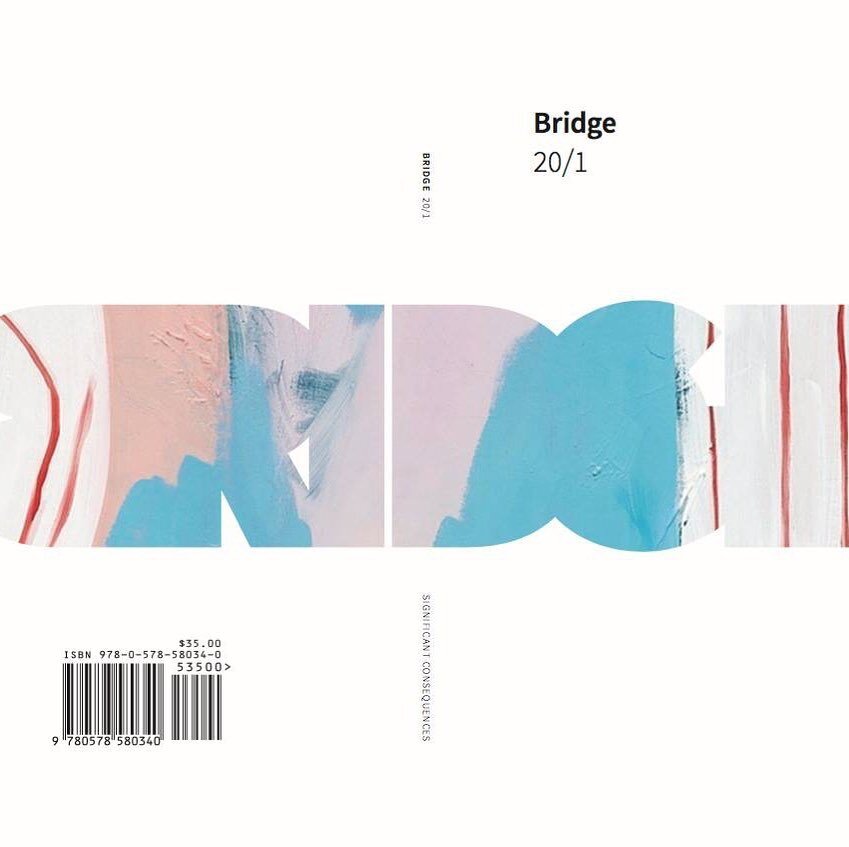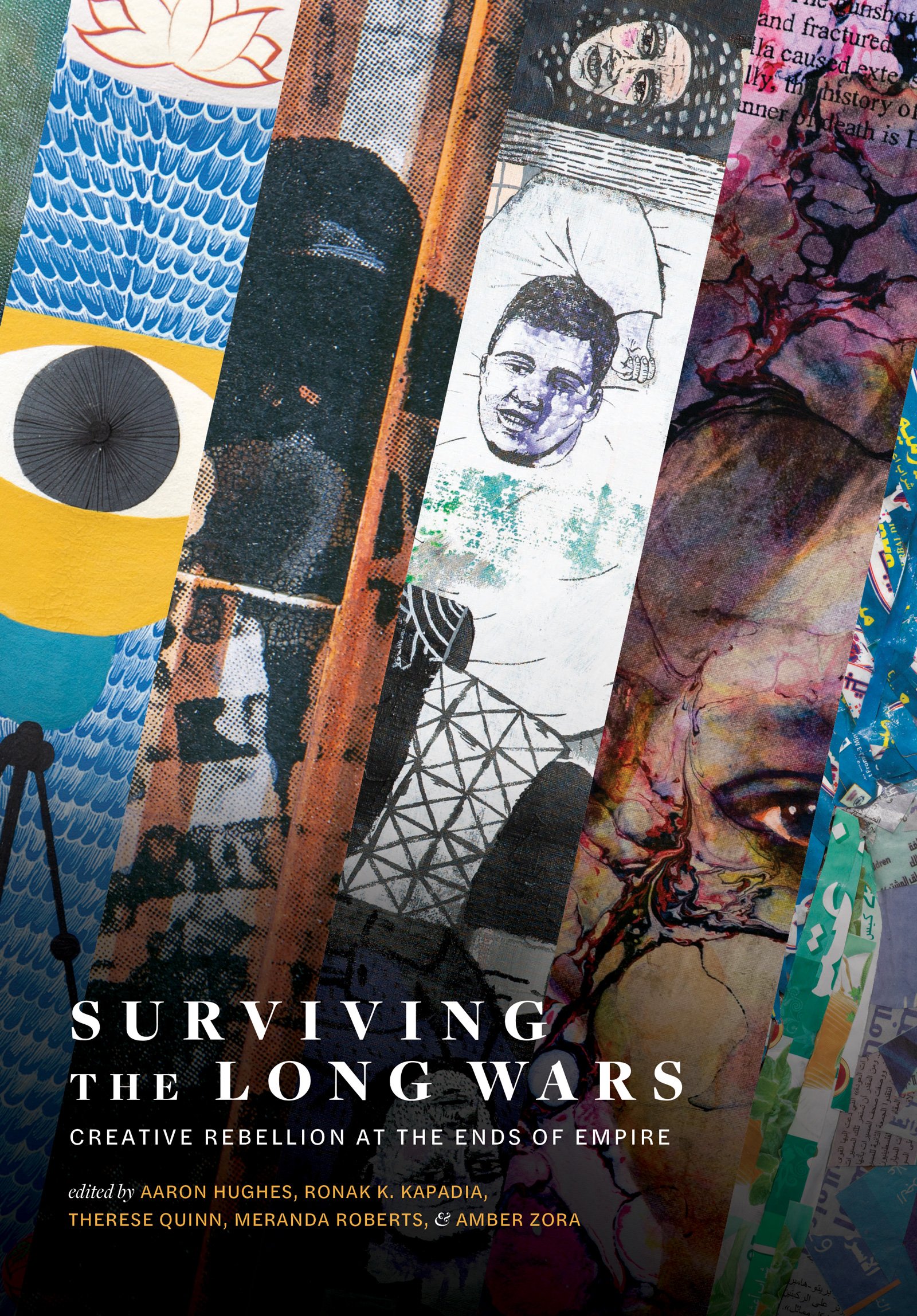BRIDGE BOOKS: “SURVIVING THE LONG WARS” Co-edited by Aaron Hughes, Ronak K. Kapadia, Therese Quinn, Meranda Roberts, and Amber Zora
AVAILABLE NOW — CLICK HERE TO ORDER
PRAISE FOR SURVIVING THE LONG WARS:
“Freedom for the conqueror is always terror and torture for the conquered, and therein lies the foundational American contradiction. The authors and artists assembled under the banner of Surviving the Long Wars look unblinkingly into that contradiction and refuse to look away. Here are the truth-tellers and popular educators, the movement-makers and organizers shining a powerful light into the darkness and illuminating a harsh reality: fighting for freedom from Britain, the colonists also fought for the freedom to continue the Atlantic slave trade, their right to own other human beings, and the freedom to annihilate the Indigenous peoples. Our vaunted American freedoms rest atop a bloody pyramid of human suffering, a monumental structure deliberately obscured by a manufactured set of fairy tales designed to smooth out the contradictions and hide the terrible truths: America is a “nation of laws,” but the lawlessness of the law itself is its most striking feature; America is a “nation of immigrants,” but the rotten foundations of settler colonialism remain a defining trait; America is a “peace-loving” country, but also the greatest purveyor of violence on earth with the largest military behemoth ever created. Don’t look behind that fraying curtain! cry the myth-making wizards of the United States of Amnesia. But let’s look anyway, and Surviving the Long Wars is a compelling guide—here is an antidote to despair and an invitation to act. Arm-in-arm, heart-to-heart, this necessary book is a light in dark times.”
—Bill Ayers, author of When Freedom Is the Question, Abolition Is the Answer
“In its commitment to the most critical and advanced forms of art practice, and to affected populations that extend beyond service members, Surviving the Long Wars distinguishes itself from the hundreds of biennials that have proliferated worldwide. Moreover, it is unique in being dedicated not to art generally, or even as thematized by a star curator, but to art made about war by those implicated.”
—Lori Waxman, Hyperallergic and primary art critic of Chicago Tribune
Placing art at the center of our struggles to come, Surviving the Long Wars is at once an eloquent and necessary archive of violent histories, a vibrant compendium of solidarity and resistance, and a generous offer of words and images to think with. It will be required reading for artists, activists, art historians, and anyone interested in joining together to chart a path to peace, repair, and justice.
—Rebecca Zorach, art historian, Mary Jane Crowe Professor in Art and Art History at Northwestern University
Surviving the Long Wars offers a groundbreaking exploration into the complex histories of US warfare and militarism, illuminating the pivotal role of art in cultivating justice, healing, and abolition. Inspired by Indigenous responses to the “American Indian Wars” and artists from the Greater Middle East and South Asia challenging the “Global War on Terror,” this volume examines the intersections between these legacies of creative rebellion and the experiences of contemporary Black, Indigenous, and People of Color (BIPOC) veterans. Informed by the emerging Veteran Art Movement and its ties to global struggles for demilitarization and abolition, the book advocates for solidarity and imaginative resistance against war and empire.
Featuring poetry, speeches, and artworks from the 2023 Veteran Art Triennial & Summit held in Chicago, the collection exemplifies the Triennial’s profound impact and critical legacy. With interdisciplinary insights spanning Native and Indigenous Studies, Middle Eastern Studies, Critical Ethnic Studies, and Museum and Exhibition Studies, Surviving the Long Wars celebrates Chicago’s legacy of resistance, while confronting erasures of Indigenous history. Renowned contributors such as Roxanne Dunbar-Ortiz, Laleh Khalili, Kyle T. Mays, and Junaid Rana offer fresh perspectives on the enduring impacts of US militarism and the potential for unexpected coalitions to emerge. At its core, Surviving the Long Wars is a clarion call for artists, organizers, and scholars to unite against US imperialism, envisioning a future of peace and justice through art and collective action.
SURVIVING THE LONG WARS is organized by Aaron Hughes, Ronak K. Kapadia, Therese Quinn, Joseph Lefthand, Amber Zora, and Meranda Roberts, with support from the University of Illinois Chicago (UIC) Institute for the Humanities Innovation grant, UIC Award for Creative Activity, Chicago Cultural Center, Hyde Park Art Center, Newberry Library, DEMIL Art Fund, and the National Endowment for the Humanities Dialogues on the Experience of War Grant. NEH Veteran Fellows include Gina Herrera, Monty Little, Gerald Sheffield, Anthony Torres, Eric Perez, and Natasha Erskine.
MORE PRAISE FOR SURVIVING THE LONG WARS:
“Surviving the Long Wars is a timely creative call to action aimed at building solidarity among artists and activists in the international pursuit of peace and justice. As astutely stated by Iraq war veteran poet Erika Renee Land, this book provides a focus on “pathfinders, not profiteers.” A recurring theme of this work, notes Anthony Torres, cofounder of the Combat Hippies theater troupe, is sharing “building blocks of solidarity.”
Expanding upon the 2023 Veteran Art Triennial & Summit in Chicago, this collection of essays, art, and poetry—much of it by US military veterans—challenges the American tradition of warring on indigenous people, from Native Americans to native inhabitants of the Middle East and Asia, and discriminating against people of color and other minorities in American communities.
Ronak K. Kapadia, a coeditor of Surviving the Long Wars, savvily sums up this arts-based resistance movement: “Through art and collective action, we can build bridges, repair harms, forge alliances, and unite in our pursuit of a more just and equitable world. Our collective survival as a species may depend on it.”
—Jan Barry, cofounder of Vietnam Veterans Against the War, author of Waging Art: Tackling Grief and Trauma with Creative Arts
“Surviving the Long Wars brings together critics and curators, artists and academics, to highlight insurgent aesthetic practices that produce counter-knowledge to the “long wars” and that offer a fugitive plan for (possibly) finding our way out. Combining stunning aesthetic and poetic practices with smart critical framing, Surviving the Long Wars is a unique and vital contribution that provides a strategy to survive and navigate within and beyond permanent war. The project’s curatorial process, bringing together visual art, poetry, and cultural critique, exemplifies the sort of coalitional strategy of survival/resistance required of our militarized existence. Indeed, among the book’s most significant accomplishments is its enactment of its central thesis—that the first task of confronting the long wars is to survive them and then to restructure the world with critical and creative aesthetic knowledge practices. Surviving the Long Wars offers a strategy for linking movements, ideas, and art across a planet fractured by militarized violence and imperial declension.”
—Alex Lubin, author of Never-Ending War on Terror
The remarkable artists, activists, and scholars in this searing work of collective aesthetic rebellion teach us to sense how the United States is not simply “at war,” framed by dry and crisp spatio-temporal bounds. Rather, through their insurgent, polyvocal, multimedia creativity, we learn to feel the visceral and embodied ways the U.S. is always already constituted by and through forms of warfare. We come to sense how our current century’s so-called “Global War on Terror” isn’t an analogue to the “Indian Wars” of the past, but rather is informed by the brutal racial-colonial logics that are its continuous and continuously shifting legacy. Surviving the Long Wars is a collective indictment of this baleful present, one jointly filed by BIPOC veterans of the US armed forces and artists from the diasporas of South Asia and the Greater Middle East. Through video installation and digital prints to embroidery, sculpture, collage, and more, Surviving the Long Wars is a gift that sparks memories of our ancestors near and far. To scholars and students, curators and archivists, organizers and activists: let this spark ignite, perhaps for the first time and perhaps once again, a political imagination capable of sensing the many entanglements that enfold us in worlds of relation and solidarity.
–Keith P. Feldman, Associate Professor of Ethnic Studies, UC Berkeley, and author of A Shadow Over Palestine: The Imperial Life of Race in America
CONTRIBUTORS INCLUDE:
Maitham Alharbi, Bassim Al Shaker, Hipólito Arriaga III, Andrea Assaf, Kevin Basl, Dorothy Burge, Miridith Campbell, June Carpenter, Bruce Carter, Brittney Chantele, Mahwish Chishty, Elexa Dawson, Jose deVera, Melissa Doud, Roxanne Dunbar-Ortiz, Sabba Elahi, Rodney Ewing, Ali Eyal, Darrell Wayne Fair, Sarah Farahat, Frontline Arts, Chitra Ganesh, Mariam Ghani, Frederick Gokliz, GOODW.Y.N., Hock E Aye Vi Edgar Heap of Birds, Gina Herrera, Aaron Hughes, Tom Jones, Rajkamal Kahlon, Ronak K. Kapadia, Ruth Kaneko, Shaymaa Khalil, Laleh Khalili, Gilbert Kills Pretty Enemy III, Erika Renee Land, Terran Last Gun, Joseph Lefthand, Nathan Lewis, Monty Little, Hanaa Malallah, Kyle T. Mays, Hector René Membreño-Canales, Dunya Mikhail, James Pakootas, Chris Pappan, Eric Perez, Yvette Pino, Therese Quinn, Isra Rahman, Michael Rakowitz, Junaid Rana, Gregory Rick, Meranda Roberts, Joseph Running Crane, Sada, Rijin Sahakian, Gerald Sheffield, Carlos Sirah, Hussein Smko, Starla Thompson, Anthony Torres, Dwayne Wilcox, Yiran Zhang, and Amber Zora


